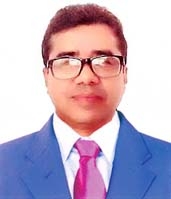
Dr. Samir Kumar Saha :
World Health Day is a global health awareness day, which is celebrated every year on April 7 under the sponsorship of the World Health Organization (WHO). The day’s theme this year is: “Let us build a fairer, healthier world for everyone”.
This year, the day is being observed at a time when coronavirus is raging across the world, including Bangladesh. Covid-19 has undercut recent health gains and pushed more people into poverty. The world is now struggling hard for taming the pandemic.
Every human being has the right to health. But this basic need is yet to be fulfilled in our country. This is why, the need to observe the day to promote health awareness is very important. The day’s message is simple: giving people access to healthcare without the prospect of financial hardship. It has reasons too.
The WHO asserts, following countless studies, the countries which invest in universal healthcare will make a sound investment in their human capital; indeed, access to a very bottom line of care and financial protection will not only truly improve someone’s health and life expectancy but also protects countries from epidemics, reduces poverty and the risk of hunger, creates jobs, drives economic growth and enhances gender equality.
There are a number of reasons regarding the dismal scenario in our health sector. The reasons include poor financing, unskilled health workers, unprofessional governance, and incomprehensive access to medicines.
Non Communicable Diseases (NCDs) have broken out in an epidemic form in the country. According to health bulletin-2015 of Health Directorate, people are facing different diseases in the country. Of the diseases, 61 percent are NCDs, which are preventable. Intake of healthy foods, exercise and stress-free life can ward off the outbreak of NCDs.
Average life expectancy of our people and economic growth has increased. Along with it, the habit of working physically has been reduced. It has intensified the scope of spreading NCDs such as cancer, cardiovascular disease and diabetes among our people. Unhealthy lifestyle and lack of physical labour has been blamed for the appearance of NCDs.
Bangladesh, in its health index in the last several years, has achieved a number of successes such as reducing mortality rate among under-five children, and average life expectancy of people increased. At the same time, distance between people and health professionals has also been increased.
Compared to people in other SAARC countries, Bangladeshi patients have to spend more money from their own pockets for their treatment and the amount is increasing gradually. Many people have been deprived of basic health care services. Health related expenditure is increasing day by day. Many people are falling into poverty every year to meet the expenditure while many others are approaching towards death after failing to manage money for their treatment.
According to an estimate of World Bank, about 64 lakh people in Bangladesh are getting poor to meet their medical expenses every year. Because, patients bear 77% of total treatment expenditure from their own pockets, while 23% is spent by the government. According to WHO, patients’ own expenditure should not exceed 32%.
The government should take necessary steps by investing in the health sector for reducing the medical cost by people. People are being deprived of getting necessary services due to the less allocation. Financial allocation in Bangladesh’s health sector is less than 1% of GDP in the last budget. According to WHO, at least 15% of total budget should be allocated for the health sector.
If we want to ensure quality in the health sector, we have to create adequate skilled manpower in the sector. At the moment, there are only three doctors per 10,000 people in the country. Proper guideline and plan is needed for creating skilled manpower and utilizing them.
There is severe discrimination regarding manpower between rural and urban areas in our health system. A large number of health professionals are available in the urban areas while it is very less in the rural areas.
The matter of drug policy is linked to health care service. Our drug policy has not been changed or updated since its inception in 1982. The government prepared a draft drug policy in 2005, but it is yet to be adopted.
Bangladesh is working for achieving the goals of sustainable development by 2030. If we want to achieve the goals in our health sector by the time, we have to invest more in the sector. If not done so, it will spell a catastrophic situation for us.
We have to take steps for ensuring Universal Health Coverage (UHC). UHC means everyone can access quality health services without financial hardship. It is an inherently political goal rooted in the human right to health.
All the people aspire to receive quality, affordable health care. WHO’s constitution affirms that the enjoyment of the highest attainable standard of health is a fundamental human right.
The UHC aims to achieve better health and development outcomes, help prevent people from falling into poverty due to illness, and give people the opportunity to lead healthier, more productive lives.
To overcome the challenges in our health sector, a multi-sectoral holistic approach can be one of the important strategies. We have to take steps for utilizing traditional medicines such as Ayurveda and Unani for the UHC. Because, it is cost-effective and can easily be available in our country.
Let us take steps to eliminate health inequities to bring people together to build a fairer and healthier world.
(The author is Vice Chairperson, Public Health Foundation, Bangladesh)

